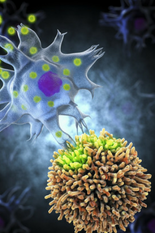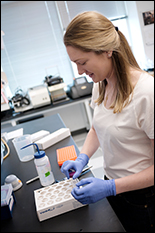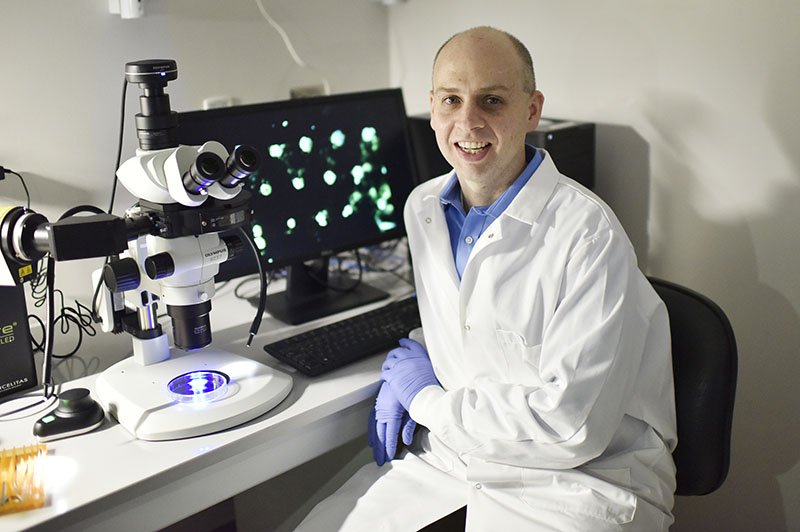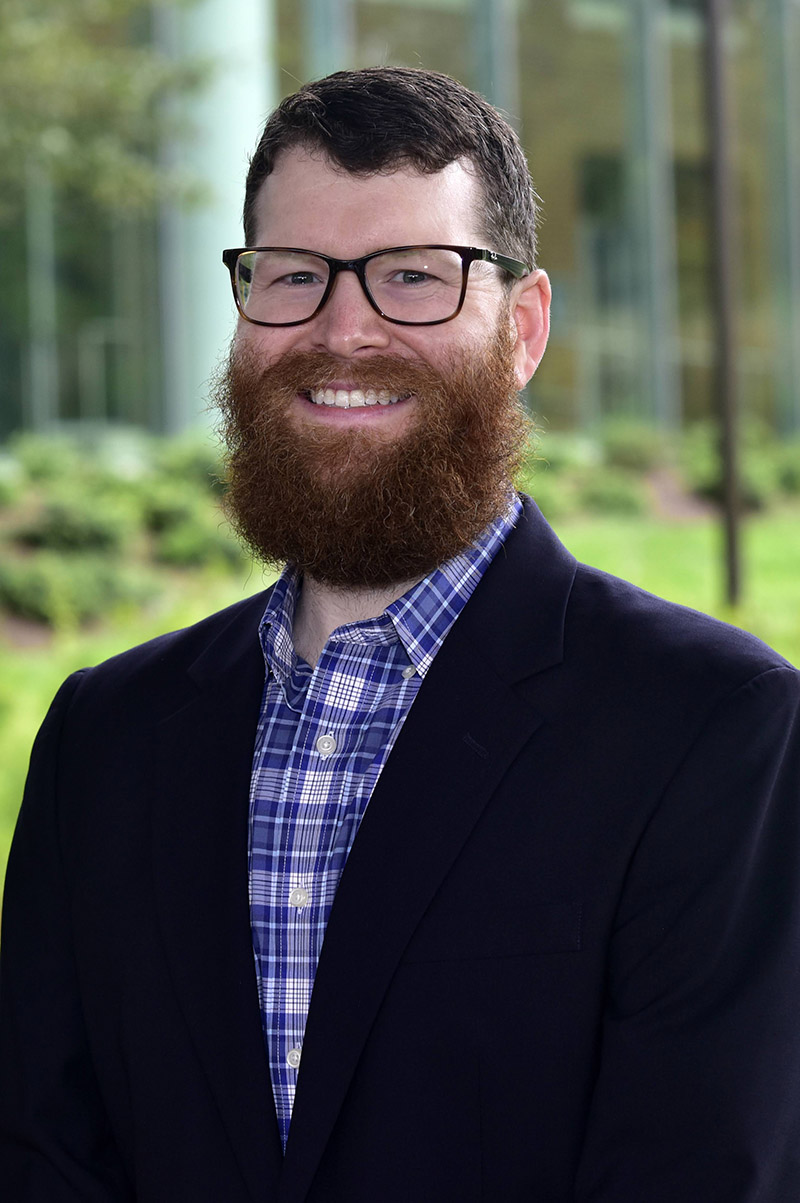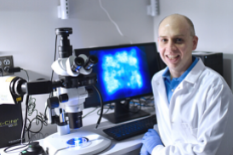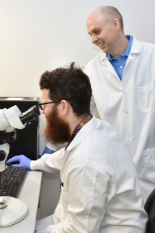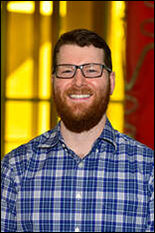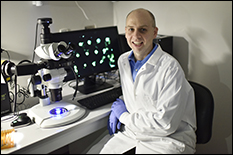News Story
BIOE Student Wins Prestigious Lemelson-MIT Student Prize
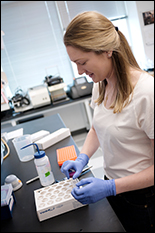
Lisa Tostanoski
Fischell Department of Bioengineering (BIOE) Ph.D. student Lisa Tostanoski has won a $15,000 Lemelson-MIT Student Prize for efforts to develop two novel biomaterials-based strategies to combat multiple sclerosis (MS) and other autoimmune diseases. Tostanoski, a researcher in BIOE assistant professor Christopher Jewell’s lab, is the first University of Maryland student to win the prestigious prize.
"Ms. Tostanoski’s innovation gives me great hope for the future of human health and patient care," said Darryll J. Pines, dean of the University of Maryland’s A. James Clark School of Engineering. “Fresh approaches to bioengineering have the potential to impact millions of patients. I am incredibly proud of her and the resolve of our entire Fischell Department of Bioengineering in their efforts to dramatically alter the course of intractable diseases.”
The nine recipients of this year’s collegiate competition were selected from a diverse applicant pool of undergraduate and graduate students from colleges and universities across the country. Tostanoski was one of two graduate students awarded this year’s prize for the “Cure it!” category, which recognizes students working on technology-based inventions that can improve health care.
“Multiple sclerosis is estimated to affect 2.3 million people worldwide,” said Tostanoski, a member of the Fischell Department of Bioengineering Jewell Research Lab. “While current clinical therapies provide important benefits for patients, they are limited by off-target effects, which leave patients immunocompromised. They also lack cure-potential, which means patients receive regular, lifelong treatments.”
Recently, scientists have explored the potential to use vaccine-like therapies to treat autoimmunity. Such techniques aim to specifically control the attack of self-molecules – like myelin in multiple sclerosis – while leaving the rest of the immune system intact. In MS, the immune system incorrectly recognizes myelin that insulates and protects nerves fibers in the brain. Immune cells enter the brain and attack, leading to slow loss of motor function and other complications. Current therapies for MS work by decreasing the activity of the immune system; but, they do so in a broadly-suppressive way that often leaves patients vulnerable to infection.
In search of a solution, researchers like Tostanoski are working to develop new strategies that enable control over combinations and doses of therapies that reach particular tissues in the body.
Tostanoski’s first project applies a targeted injection technique to deposit degradable polymer carriers – loaded with the desired therapeutic cargos – directly in lymph nodes, the tissues that coordinate the body’s immune responses. These particles slowly degrade in the lymph nodes, releasing signals that program cells not to attack “self” tissues. Instead, these cues aim to expand regulatory immune cells that could then leave the lymph nodes and move to the brain and spinal cord to control inflammation and disease. The research team, which joins together the Jewell Lab and the immunology lab of Dr. Jonathan Bromberg at the University of Maryland School of Medicine, is currently working to understand the mechanism as well as the translational potential to other disease models. Their findings were recently highlighted in the journal Cell Reports.
In the second approach, Tostanoski and fellow researchers use specialized technology to create immune polyelectrolyte multilayers (iPEMs) built entirely from immune signals. These iPEMs are self-assembled on particle templates during production. Then, the templates are dissolved to leave hollow capsules that consist only of the immune cues the lab wants to deliver, eliminating the need for carrier components. University of Maryland School of Medicine Professor of Neurology Walter Royal and members of his lab collaborated with Tostanoski and Jewell to conduct pilot studies investigating how iPEMs interact with samples from human MS patients. Findings from these studies were published in ACS Nano.
Tostanoski, Jewell, and the research team have shown that this approach controls inflammation in samples from human multiple sclerosis patients, and eliminates disease in mouse models of multiple sclerosis. This cutting-edge technique mimics useful features of biomaterial therapeutics – such as co-delivery, targeting, and “cargo” protection – but is much simpler because no carrier components are needed. Even more, this feature also eliminates the risk of activating the immune system in the unintended or unexpected ways sometimes associated with synthetic materials.
“More specific and effective therapies for autoimmunity could transform treatment options for patients with autoimmune disease such as multiple sclerosis, type 1 diabetes, and lupus” said Jewell. “Lisa has really embodied the fearlessness and rigor required to bring engineering and immunology together and push these innovative ideas forward.”
“Lisa’s work – and that of the Jewell Research Lab – demonstrates the enormous potential for bioengineers to shape the future of human health innovation,” said John Fisher, Fischell Family Distinguished Professor and Chair of the Fischell Department of Bioengineering. “Even more, her dedication to the field extends beyond the lab, as she devotes much of her time to mentoring aspiring engineers. For these reasons, Lisa exemplifies what it means to receive the Lemelson-MIT Student Prize. We at the Fischell Department of Bioengineering applaud her on this most recent achievement, and celebrate this historical first for the University of Maryland.”
The Lemelson-MIT Student Prize is supported by The Lemelson Foundation. Student prize applicants were evaluated by screening committees with expertise in the invention categories, as well as a national judging panel of industry leaders. Screeners and judges assessed candidates on breadth and depth of inventiveness and creativity; potential for societal benefit and economic commercial success; community and environmental systems impact; and experience as a role model for youth.
“The 2017 Lemelson-MIT Student Prize winners show exceptional inventiveness and creativity in solving real world problems,” said Stephanie Couch, executive director of the Lemelson-MIT Program. “Through their outstanding accomplishments and commitment to mentoring younger students, these promising inventors are inspiring a new generation of problem-solvers.”
“These students display the brilliance and hope of their generation,” said Dorothy Lemelson, Lemelson Foundation chair. “We are proud to recognize them for their achievements.”
Prior to receiving the Lemelson-MIT Student Prize, Tostanoski was named a National Science Foundation Graduate Research Fellow and the University of Maryland’s 2015 Fischell Fellow. She has also contributed to five intellectual property filings, to date.
This work was supported by grants to the Jewell Research Lab from the National Multiple Sclerosis Society, the U.S. Department of Veterans Affairs, and the National Science Foundation.
In addition to the Lemelson-MIT Program and The Lemelson Foundation, Tostanoski thanks Prof. Jewell, members of the Jewell lab, Dr. Bromberg, Dr. Royal and additional collaborators at the University of Maryland School of Medicine, and the U.S. Department of Veterans Affairs Multiple Sclerosis Centers of Excellence for their continued support for her research endeavors.
The full Lemelson-MIT press release announcing this year's winners is available online.
Published April 19, 2017
